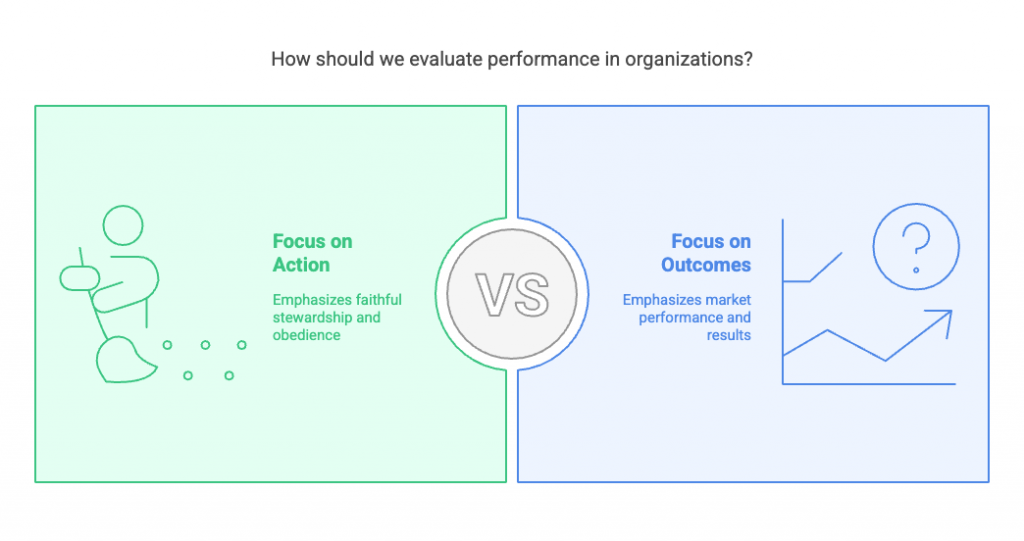

Control what you can. Let go of what you can’t. Simple advice we’ve all heard. Yet most operate on a model that contradicts this wisdom.


Control what you can. Let go of what you can’t.
Simple advice we’ve all heard. Yet most businesses operate on a model that fundamentally contradicts this wisdom. We’ve built entire performance systems around outcomes we cannot guarantee.
The OKR (Objectives and Key Results) framework has dominated business strategy for decades. Google made it famous. Silicon Valley worships it. And now, countless businesses measure their worth by results they ultimately cannot control.
This is a problem. A theological problem. A psychological problem. And a practical business problem that’s creating unnecessary anxiety, burnout, and misalignment in organizations worldwide.

We live in an outcome-obsessed business culture. We fixate on metrics, KPIs, and results as if we can will them into existence through sheer determination. The truth? Results happen at the intersection of our actions and countless external variables beyond our control.
The market shifts. Competitors launch. Economies collapse. Trends emerge. Algorithms change. People make unexpected choices.
Yet we continue building performance frameworks that judge success and failure based on outcomes rather than faithful execution. This creates a culture where teams feel perpetually inadequate when circumstances beyond their control affect results.
This isn’t just ineffective. It’s unbiblical.
I don’t care if you believe in the Bible or not, the principles simply work when applied.
And guess what, your favourite gurus use Biblical principles in hindsight.
Scripture repeatedly emphasizes our responsibility for obedience, not outcomes. Consider the parable of the talents. The master didn’t reward the servants based on market performance. He rewarded their faithful stewardship of what they controlled.
The servant who buried his talent wasn’t condemned for poor investment returns. He was condemned for failing to take action with what he was given.
Paul writes in 1 Corinthians 3:6, “I planted, Apollos watered, but God gave the growth.” This is the perfect business framework. We are responsible for planting and watering. The growth comes from factors beyond our control.
When we confuse these responsibilities, we create dysfunctional organizations that punish people for circumstances beyond their influence and reward others for fortunate timing rather than faithful execution.
Action on the right tasks matter more than timing or outcome.

This brings us to OKAs: Objectives and Key Actions. This framework maintains ambitious objectives but measures success by the completion of strategic actions rather than the achievement of specific results.
The difference seems subtle but transforms everything:
Traditional OKR: “Increase new customer acquisition by 30% this quarter.”
OKA Alternative: “Execute our new customer acquisition strategy with excellence by completing these five key actions…”
The first approach creates anxiety because the team cannot guarantee a 30% increase regardless of their performance. Market conditions, competitor moves, or economic shifts might make this impossible despite flawless execution.
The second approach focuses the team on what they can control: their actions. When those actions are strategically sound and executed with excellence, results typically follow by design.
Business leaders rarely consider how outcome-based frameworks affect team psychology. When we tie identity and success to results beyond our control, we create perpetual anxiety.
This anxiety doesn’t improve performance. It degrades it.
Research consistently shows that performance anxiety reduces creativity, limits cognitive flexibility, and encourages short-term thinking. Teams become risk-averse, afraid to experiment, and reluctant to report problems early.
The cruel irony? This anxiety makes the desired outcomes less likely, not more.
By shifting to action-based measurement, we create psychological safety that allows teams to focus on execution rather than worrying about factors beyond their control.

Here’s where this approach becomes truly revolutionary: When we release our grip on outcomes and focus instead on excellent execution, we often achieve better results than when we fixate on the outcomes themselves.
This paradox appears throughout scripture. “Whoever finds their life will lose it, and whoever loses their life for my sake will find it” (Matthew 10:39).
The same principle applies in business. Companies obsessed with growth metrics often make short-sighted decisions that undermine long-term success. Companies focused on excellent execution of sound strategy typically outperform over time.
Consider the difference between these approaches:
Outcome-focused: “We must hit our sales targets this quarter no matter what.”
Action-focused: “We must execute our sales strategy with excellence and learn from the results.”
The first approach often leads to discounting, channel stuffing, quality compromises, and team burnout. The second builds sustainable growth through continuous improvement. One is sustainable, creates a healthy culture and advocates long-term results compared to short-term pleasure.
For service-based businesses and thought leaders, this shift is particularly crucial. Your results depend on complex human relationships and market perception that cannot be directly controlled.
Here’s how to implement OKAs in your organization:
1. Start with clear objectives. What are you ultimately trying to achieve? This doesn’t change from the OKR model.
2. Identify the strategic actions that should logically lead to those objectives. These must be completely within your team’s control.
3. Create clear completion criteria for each action. What does excellent execution look like?
5. Celebrate and reward excellent execution, not just favorable outcomes.
6. Use outcome data for learning and strategy refinement, not performance evaluation.
As faith-driven entrepreneurs, we have an opportunity to lead differently. We can build cultures that value faithful stewardship over fortunate circumstances.
This doesn’t mean lowering standards or accepting mediocrity. Quite the opposite. It means holding ourselves and our teams accountable for excellence in the things we can control while trusting God with the results.
When Peter stepped out of the boat to walk on water, Jesus didn’t command him to successfully walk on water. He commanded Peter to come. The action was Peter’s responsibility. The outcome was in God’s hands.
This is the model for faith-driven business leadership. We step out in faith, taking the actions we believe are right. We execute with excellence. And we trust God with the results.
For service-based businesses, this shift is transformational. Client results often depend on factors beyond your control. You can deliver perfect strategy, but if the client fails to implement, the results won’t materialize.
I’ve delivered hundreds of leads to companies who did not have a proper sales process in place. The result? Wasted leads because there was no clear direction on their objective and processes. We delivered perfectly, but the result didn’t materialize.
OKAs allow you to measure what matters: the quality and completeness of your service delivery. This creates healthier client relationships because expectations are properly aligned from the start.
Of course, you’re still encouraged to sell the result, because, as I mentioned in an earlier article, people buy transformations, not tasks. However, for your delivery process, key actions on how you implement that transformation is important.
You promise excellent execution of proven strategies, not specific outcomes that depend on variables beyond your influence.
Especially in today’s age, where everyone promises overarched results, you can stand out by simply being honest and not overpromising on your offer.

Shifting from OKRs to OKAs requires courage. It means swimming against the current of conventional business wisdom. It means having difficult conversations about responsibility and control.
But the alternative is continuing to judge ourselves and others based on outcomes we cannot guarantee. This creates unnecessary anxiety, misaligned incentives, and ultimately, poorer performance.
The truth is powerful: We control our efforts, not their outcomes.
When we build our business frameworks around this truth, we create healthier organizations that can pursue ambitious objectives without the crushing weight of outcome anxiety.
The most successful businesses aren’t those that achieve every target. They’re those that execute with excellence, learn continuously, and maintain the resilience to persist when outcomes temporarily disappoint.
Control what you can. Let go of what you can’t.
This isn’t just good life advice. It’s the foundation of sustainable business growth beyond traditional advice.
Stay ahead. Stay dominant. The Insider Brief delivers expert insights and strategies to position you as the thought leader in your market.
We don't send out a lot of emails, just the important things you really need!
